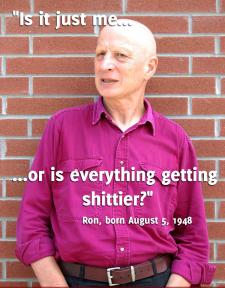P@SW: Talk Sixty to Me - so we can interpret for you

It has been a long standing joke among my friends that if I’m serious about getting out of this playwriting gutter, I should write a play about the First World War. Because Canadians of a certain age – the types who have season tickets to regional theatre companies – love the First World War. In response to our aging demographics, I’ve considered moving it up a notch by writing about the Second World War instead.
The suspicion that theatre patrons of a certain vintage will come out in droves to work tailored to suit them was confirmed by the audience at the performance of Talk Sixty to Me that I attended. And boy, I wouldn’t mind having such an affluent and influential-looking group of people (the patina of success was almost blinding) listening to my words.
Not that they were listening to Oonagh Duncan’s words either. Talk Sixty to Me is a verbatim play based on conversations Duncan recorded with 72 people born in 1948. She then shaped this material into a collage of different voices that were performed with admiral dexterity by four performers. The play was organized into different categories such as sex, death and “what are you doing next, you old fucker” (just to be clear, I made up the old fucker part).
So there’s no narrative. Instead we have performers repeatedly entering and exiting the stage and negotiating around and through a series of coat racks. The point of the coat racks – which have strips of fabric hanging from them – is not clear but with the way director Philip Adams has the performers jumping through them endlessly put me in mind of a jungle-gym for seniors. So maybe it’s to keep them active until the end of the run.
Work like this must stand or fall on the strength of the bon-mot supplied by the interviewees. And there are some goodies. One man describes what he calls the “Ikea Summits”, where important decisions about an elderly parent were made over a $1.00 Ikea hot dog. Or the woman who rather than dying imagines placing herself on an ice floe – although global warming has seriously reduced her chances of realizing that ambition. Or the woman who describes how other women her age evolve into what she describes as “pigeons” – women with short, greying hair, whose bodies have become, well, pigeon-shaped.
All good stuff.
And so much good will. No doubt the interviewees felt honoured by Duncan’s interest in their lives. No doubt the audience felt delighted to see themselves reflected on stage (and heaven knows, this generation needs a voice, they never get enough attention).
Still, while all these words rolled on and all that good will filled the theatre, I was troubled by a nagging thought. What, exactly, was the point? How was Talk Sixty to Me a better forum for achieving Duncan’s objectives than, say, making a documentary? If the idea is to give insight into the thoughts and feelings of a specific demographic then I would argue that, in Duncan’s hands, verbatim theatre is far less effective than simply making a documentary. Sure the words might be “real”, but the context for understanding those words is gone, the authentic voice is replaced by a performer who may (or may not) be attempting to mimic the intentions and feelings of the original speaker. Ideas from one person are smashed up against ideas from another that may or may not be related or connected.
Mistakenly – in my opinion – the production even evokes the documentary format with a series of surtitles that provide us with statistics, handy facts about boomers or biographical information about the “speakers”. You know, the kind of information you get in a documentary before cutting to a talking head.
So Talk Sixty to Me is a heavily mediated version of authenticity. We are left with what Duncan is able to achieve as an artist through her cutting and pasting that is greater or significantly different from what a documentary filmmaker would have achieved. Frankly, I left the theatre hungry to hear for myself the voice of the woman who wants to go out on the ice floe or the man who had to endure the Ikea Summits. If you’re going to tease me with authenticity, then give me authenticity.
Then, I went next door and listened to what Morgan Jones Philips had to say.
Talk Sixty to Me by Oonagh Duncan; Directed by Philip Adams; Presented by Oyster Productions; Featuring Cayle Chernin, Bonnie McDougall, Allan Price, Andrew Scorer. Part of the 2008 SummerWorks Festival. For more information and show times, why not go here.



